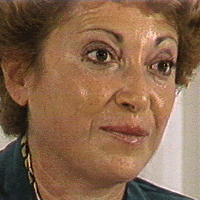The Other Reality TV
In the late 1970s and early 1980s, more than twenty years before Pop Idol (and its US copy, American Idol), a group of Holocaust Survivors in Connecticut decided to film their own reality television. Rather than instant celebrity,
 their aim was to record their memories for posterity using contemporary technology. Despite the emotional upheaval that doing so would cause them, they believed that the testimonies they would provide for future generations would be worth it. Large institutions were beginning to be able to afford to buy their own television cameras, and the group hoped that they could put together enough funding to use one and then archive the resulting videotapes.
their aim was to record their memories for posterity using contemporary technology. Despite the emotional upheaval that doing so would cause them, they believed that the testimonies they would provide for future generations would be worth it. Large institutions were beginning to be able to afford to buy their own television cameras, and the group hoped that they could put together enough funding to use one and then archive the resulting videotapes.
The effort succeeded beyond their wildest dreams. Twenty years on, the Fortunoff Video Archives contains video testimonies not just from Connecticut, nor even only from the United States and Israel, but from all over the world. It has spawned numerous other Holocaust oral history archives in New York, Washington, Jerusalem, and elsewhere (some funded by institutions, others by philanthropists such as Steven Spielberg), and provided one of the first models for how to create, construct, and order an oral history archive, influencing similar projects that evolved in the aftermath of the national catastrophes in Cambodia, Tibet, and Bosnia.
 Maintaining the archive is not easy work. In order for the archive to reference and cross-reference these testimonies, work-study students provide summary transcriptions of each testimony in English, which Joanne Rudof and her team scrupulously organize and make available. This involves a number of graduate and undergraduate students, both Jewish and non-Jewish, listening intently to video testimonies, usually in 2-hour blocks, during the year and then writing the transcriptions. I was one of those students for two years and I know it can be an intense job.
Maintaining the archive is not easy work. In order for the archive to reference and cross-reference these testimonies, work-study students provide summary transcriptions of each testimony in English, which Joanne Rudof and her team scrupulously organize and make available. This involves a number of graduate and undergraduate students, both Jewish and non-Jewish, listening intently to video testimonies, usually in 2-hour blocks, during the year and then writing the transcriptions. I was one of those students for two years and I know it can be an intense job.
Unlike the Spielberg effort, the testimonies in the Fortunoff archive are not edited at all. This decision has two ramifications. First is the practical problem of storing a large number of aging videos and/or transferring them onto other formats. Second, and the subject I will go on to discuss below, is the length of many of the testimonies. Although the length varies (and I'm told that it often varies with nationality) the Hebrew testimonies that I listened to mostly went on for 10 hours or longer. As a result, watching holocaust video testimony is often really boring, and it's getting more boring by the year. No one-not the staff of the archive, nor writers who write about the videos, nor students who work at the archive-ever mentions this. It's as if the fact that countless hours of the testimonies are tedious is a shameful secret that should be kept hidden. Well it's not a shame and it shouldn't be a secret.



The Queer Guy at the Strip Club
Jay Michaelson
The Gifts of the German Jews: Toward a Postmodern Judaism
Michael Shurkin
My first shabbos
Jennifer Waters
Stones of Jerusalem
David Goldstein
Holocaust Video Testimonies: The Other Reality TV
Dan Friedman
Josh Tells a Bedtime Story
Josh Ring
Zeek in Print
Buy online here
Saddies
David Stromberg
About Zeek
The Zeek Archive
Links